
20 minute read
HEALTH
The ‘Other’ Pandemic
By Cory Sekine-Pettite
You don’t need a doctor to tell you that the past year or so has been incredibly stressful for everyone. Whether or not you’ve actually dealt with COVID-19 directly, you most certainly have had to deal with the repercussions — particularly when it comes to your mental state. The uncertainty surrounding the virus itself, the economic impact of the pandemic, and the political crises borne out of an unparalleled healthcare disaster all have contributed to an additional national emergency concerning our mental health.
According to an American Psychological Association poll from last November (as reported in February 2021 in The New York Times), 74 percent of the psychologists who responded said they were seeing more patients with anxiety disorders compared with before the pandemic, and 60 percent said they were seeing more patients with depressive disorders. Nearly 30 percent said they were seeing more patients overall. The poll did not ask doctors if they had turned
— Dr. Ganielle Hooper of Axis Hope, LLC
away patients due to overwhelming demand.
What’s worse, a recent study published in the Journal of American Medical Association (bit.ly/37HHLcf) finds that 12 percent of adults surveyed seriously considered suicide in the prior month while 29.6 percent reported COVID-19-related trauma and stressor-related disorder symptoms. Additionally, 33 percent of the 5,186 respondents in the study reported anxiety or depression symptoms, and more than 15 percent reported increased substance use.
So, while we may not need a doctor to tell us that we are stressed, many of us could use the guidance and treatment of healthcare professionals to treat our current state of mind. As such, Cobb In Focus reached out to Dr. Ganielle Hooper of Axis Hope, LLC in Marietta to talk about the anxiety issues caused by the pandemic and how she is treating those problems in her patients. Dr. Hooper is dual certified as a pediatric nurse practitioner and mental health specialist. She treats both children and adults in her practice.
“The practice has grown tremendously in 2020, directly related to COVID,” Hooper said. “…We’re treating the same disorders, but just an increase of them [in terms of number of patients seen.]” For the most part, Hooper said she sees patients who are dealing with ADHD, depression, anxiety, and substance abuse, many of whom say their symptoms began or worsened during 2020. She said her practice sees approximately 50 patients per week, up from about 30 patients per week prior to the pandemic.
For the most part, Hooper is seeing her patients through online visits, a practice known as telemedicine. Since the pandemic, she says about 80 percent of patients are seen through online video visits, whereas before the pandemic, Hooper saw just 20 percent of her patients in this manner. There are exceptions, however, such as young children, who are more successfully treated with in-person visits or therapy sessions.
It’s not all doom and gloom. The pandemic-induced lockdown and social distancing has improved the mental states of a small group of people — those who are otherwise stressed in social situations. Dr. Hooper said some of her patients have, in fact, flourished during the pandemic. “I’ve seen actually seen a ‘handful’ of kids who have thrived in this environment because they, for example, may have social anxiety. So they’re very happy with staying home and being with mom and dad, and not having to raise their hand in a classroom,” she said. “They are thriving. I’ve even had some patients who have done so well being in the home setting that they’ve asked to come off medication.”
Long-term impact
When a majority of our population is vaccinated against COVID-19 and the pandemic is declared over, for many of us the mental health issues will remain — at least to some degree. “I think there’s going to be some scarring from the pandemic, and there will be a lot of uncertainty,” Hooper said. “There’s going to be a lot of hesitation for some people; they won’t believe it’s truly cleared or truly over. So you’re still going to have those who will remain in isolation. You’re going to have some long-term impacts from these kids being isolated and these kids having lack of human connection and socialization for a year. We’re going to see the impact of that down the road.” We will see some gaps in recovery from this, Hooper said, and it could take years. “Although we may not need to wear masks, or require the social distancing and the hand sanitizer, we’re going to need another three to five years to fully recover from this,” she said. “…It’s going to be a difficult but a worthy transition once we’re out of this pandemic.”
Photo by LaRuche Creative
You are not alone
While some people may be happier in isolation, most of us are not so enthused and we likely knew this pre-pandemic. But when asked what COVID-19 may have taught us about ourselves, Hooper said it has taught us to better appreciate our family and friends. “I think most importantly, I would love for people to learn that they are not alone in their struggles,” she said. “What I’ve seen is that people think ‘I’m the only one suffering; I’m the only one going through anxiety. I’m the only one who’s drinking every night. I’m the only one who can’t pay my bills.’ And if they could just understand that everyone is going through struggles, everyone is having issues. …It’s just a matter of how they choose to deal with it.”
“So I want people to take that away from this whole pandemic — you don’t have to suffer alone, because there are people dealing with the same thing out there, and there’s help for it, Hooper continued. “A lot
of times, people just don’t know where to turn; they don’t know access is available, and they think that they’re the only ones dealing with it. So once we get the word out about it, talk about mental health more and educate the population about treatment for mental health, we can begin the healing process.”
Self-care and coping skills
Treatment doesn’t begin and end at the doctor’s office. There are steps one can take to reduce stress and ease anxiety. Selfcare is crucial for both our mental health and physical wellbeing. Exercise, a regular sleep schedule, proper nutrition, and finding ways to relax (hobbies, nature walks, spending time with family and friends, etc.) are all proven, key self-care techniques. Hooper, who juggles her practice, her family, her military duties in the Air National Guard, and part-time teaching gigs at Kennesaw State University and Emory University says that for her own selfcare she finds downtime is crucial to preparing herself mentally for her patients. “If I’m burned out, I can’t give anything to my patients,” she said. Hooper also schedules lunch dates with other therapists as a way to not only relax, but to check in with her colleagues and they, in turn, can check in on her. “That gives me some downtime where I can kind of network and speak with others,” she said.
Learning to relax is vital, but it won’t make all of our anxiety and stress disappear. We also must acquire coping skills to
Mind Your Mind
The Cobb Collaborative, a provider of support, training, and organizational development services, has launched the Mind Your Mind mental health campaign to proactively address the need for mental health support, particularly as the burdens of COVID-19 continue to affect families across the region.
“Mental illness affects one in five of us, yet so many people are hesitant to get help or are unaware of the resources available to them. Mind Your Mind aims to empower the community by providing access to helpful information and perspectives, “ says Cobb Collaborative Executive Director Irene Barton. “We are striving to take away the barriers to care with diverse opportunities accessible by the computer or in person and at no cost to the participant.”
A recent Kaiser Family Foundation poll reported that nearly half of the U.S. population states that the pandemic is adversely affecting their mental health. Forty-five percent of adults stated the crisis had “negatively” impacted their psyche, and 19 percent stated it has had a “major” impact on their mental health. Models using data trends from past national emergencies reflect that the continued increase in the jobless rate will likely result in increased suicides, overdose deaths, and substance abuse relapse. School educators, social workers, and psychiatrists and counselors are fearful for children who live in homes affected by mental health — without seeing them at school each day, they cannot monitor the wellbeing of children.
The initiative includes online content and resources, professional-level trainings, documentary film screenings, and panel discussions about sensitive topics including anxiety, stress, and trauma. The campaign started with support from Cobb & Douglas Public Health through its Community Health Improvement Plan. Today, the campaign is made possible through a grant from the Jesse Parker Williams Foundation, Northside Hospital Foundation, and Cobb & Douglas Public Health.
This year, the initiative has taken an intentional focus to also include suicide prevention and awareness within its programming. The Cobb Collaborative has developed a strategy to convene community members, organizations, and systems to become traumainformed, to recognize the warning signs of suicide, and to point individuals in the direction of appropriate support. Included in this initiative are multiple training events, a Suicide Prevention Toolkit and webpage of resources, and a communications strategy to leverage awareness and prevent suicide attempts.
The Cobb Collaborative is the local partner for the Georgia Family Connection Partnership, bringing together more than 3,000 local and state organizations in all 159 counties across Georgia who work toward measurably better outcomes for the state’s children, families, and communities. The Collaborative joins them and Resilient Georgia, a statewide agency dedicated to healing adversity and promoting resiliency in children and families through the prevention and early intervention of Adverse Childhood Experiences (ACE’s) with trauma-informed care. Barton serves as a member of their Education Committee and is incorporating their trauma-informed framework in the offerings included in Mind Your Mind.
All trainings, panel discussions, film screenings, and online resources are offered at no cost to the community. For information and calendar listings for upcoming events or other programs at the Cobb Collaborative, visit cobbcollaborative.org

manage our mental health. “We are born with very minimal coping skills. So the skills that we learn as a child, as adolescents, are what we pick up from our environment, and experiences,” Hooper said. “And that may be either healthy or unhealthy. But we can learn the effective coping skills through therapy and specifically cognitive behavioral therapy.”
According to the American Psychological Association (APA), cognitive behavioral therapy (CBT) is a form of psychological treatment that has been demonstrated to be effective for a range of problems including depression, anxiety disorders, alcohol and drug use problems, marital problems, eating disorders, and severe mental illness. Techniques and treatments may vary by therapist, but CBT places an emphasis on helping individuals learn to be their own therapists, the APA says. Through exercises in the session as well as “homework” exercises outside of sessions, patients/clients are helped to develop coping skills, whereby they can learn to change their own thinking, problematic emotions, and behavior.
Therapists emphasize what is going on in the person’s current life, rather than what has led up to their difficulties. A certain amount of information about one’s history is needed, but the focus is primarily on moving forward in time to develop more effective ways of coping with life. So when you’re having a lot of anxiety or you’re feeling anxious or having a panic attack, Hooper says you can pull these mental tools out your “bag” and say, “Oh, she taught me how to manage this.”
Ask for help
Any time that you are feeling overwhelmed with anxiety and stress, Hooper stresses that it is OK to ask for help. There is no shame in seeking the advice of professionals. “There’s a lot of stigma still associated with mental health. And I think the more we talk about it, the more we can normalize it and then people can begin helping others,” she said.
Additional resources
• Psychology Today magazine (psychologytoday.com/us/groups) maintains a list of Axis Hope 2551 Roswell Road, Suite 420, Marietta, GA 30062 For appointments: 678.503.8629 https://axishope.care
providers that can be filtered by location, type of insurance covered, specialty or other criteria. • The federal government has a website (findtreatment.gov) where you can search for facilities that treat substance use disorders, addiction, and mental illness. • There are many national organizations that offer resources on support groups in your area, including the National
Alliance on Mental Illness (nami.org), the National Eating Disorders Association (nationaleatingdisorders.org),
Alcoholics Anonymous (aa.org), or the
Depression and Bipolar Support Alliance (dbsalliance.org). • If you are having thoughts of suicide, call the National Suicide Prevention Lifeline at 1-800-273-8255 (TALK). n
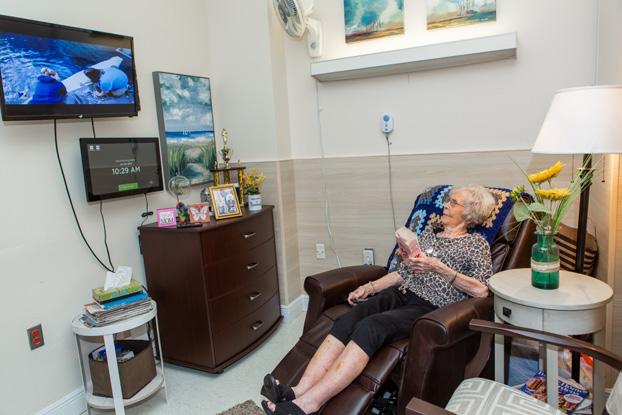
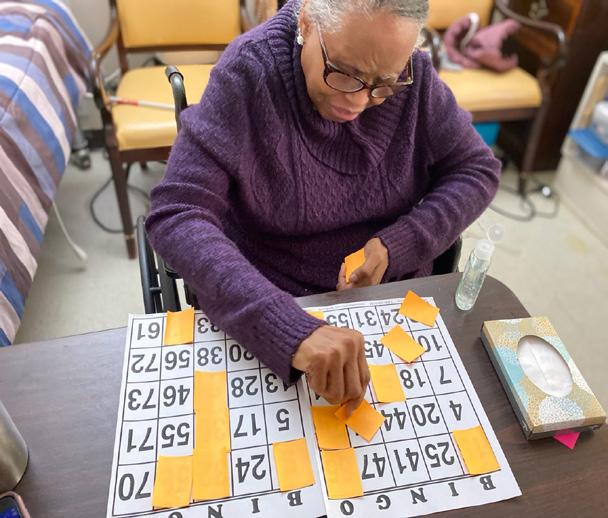
www.agrhodes.org
A.G. Rhodes provides a safe environment for long-term care, short-term recovery, and therapy and rehabilitation services.
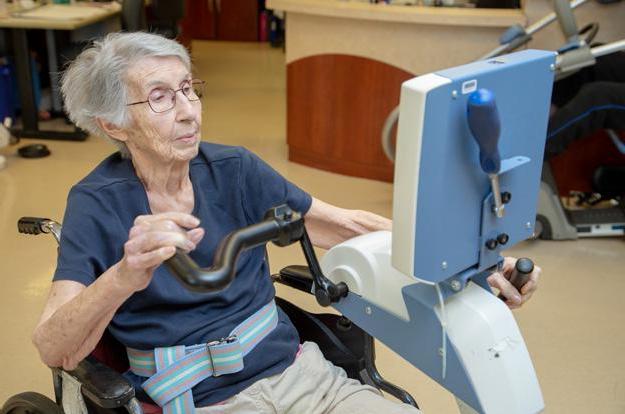
A.G. Rhodes is an ideal stop between hospital and home for those recovering from surgery, illness or regaining strength. • State-of-the-art therapy and rehabilitation services including physical, occupational and speech therapies • Innovative programs • Comprehensive, personalized care • Nonprofit, mission-driven • Five-star rating!
Contact Us:
InfoCobb@agrhodes.org 770-427-8727 900 Wylie Rd. SE Marietta, GA 30067
A Powerful Team
A trifecta unfolded to help rid Georgia of the ever-growing number of sexual exploitation of children and human trafficking cases.
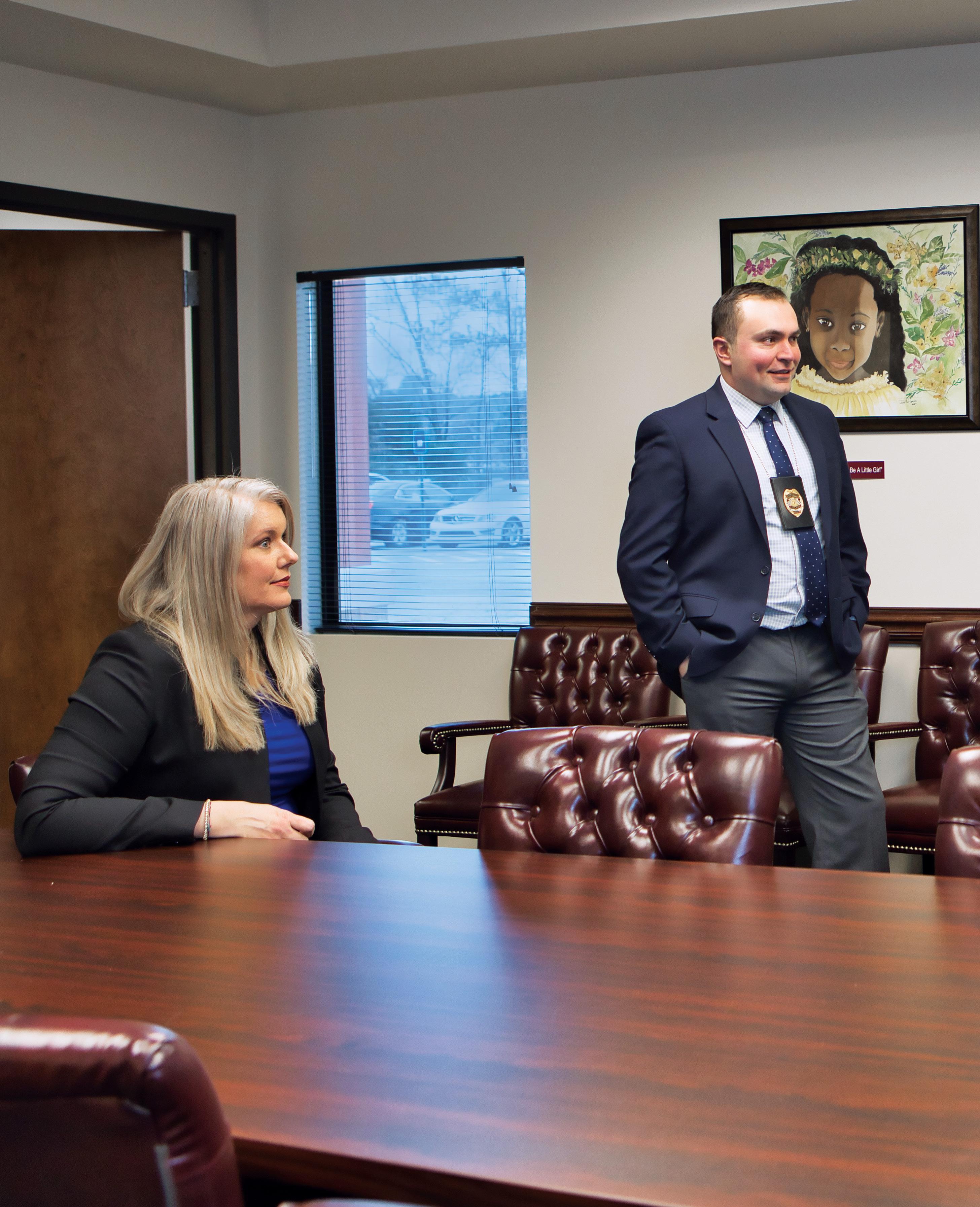
From left to right: Aleks Jagiella-Litts, CEO and General Counsel, Children’s Advocacy Centers of Georgia; Det. Clint Monahan, Special Victims Unit, Cobb County PD; Georgia First Lady Marty Kemp; Sgt. Hunter Llewellyn, Special Victims Unit, Cobb County PD; and Lt. Matt Brown, Special Victims Unit, Cobb County PD.
By Lindsay Field Penticuff
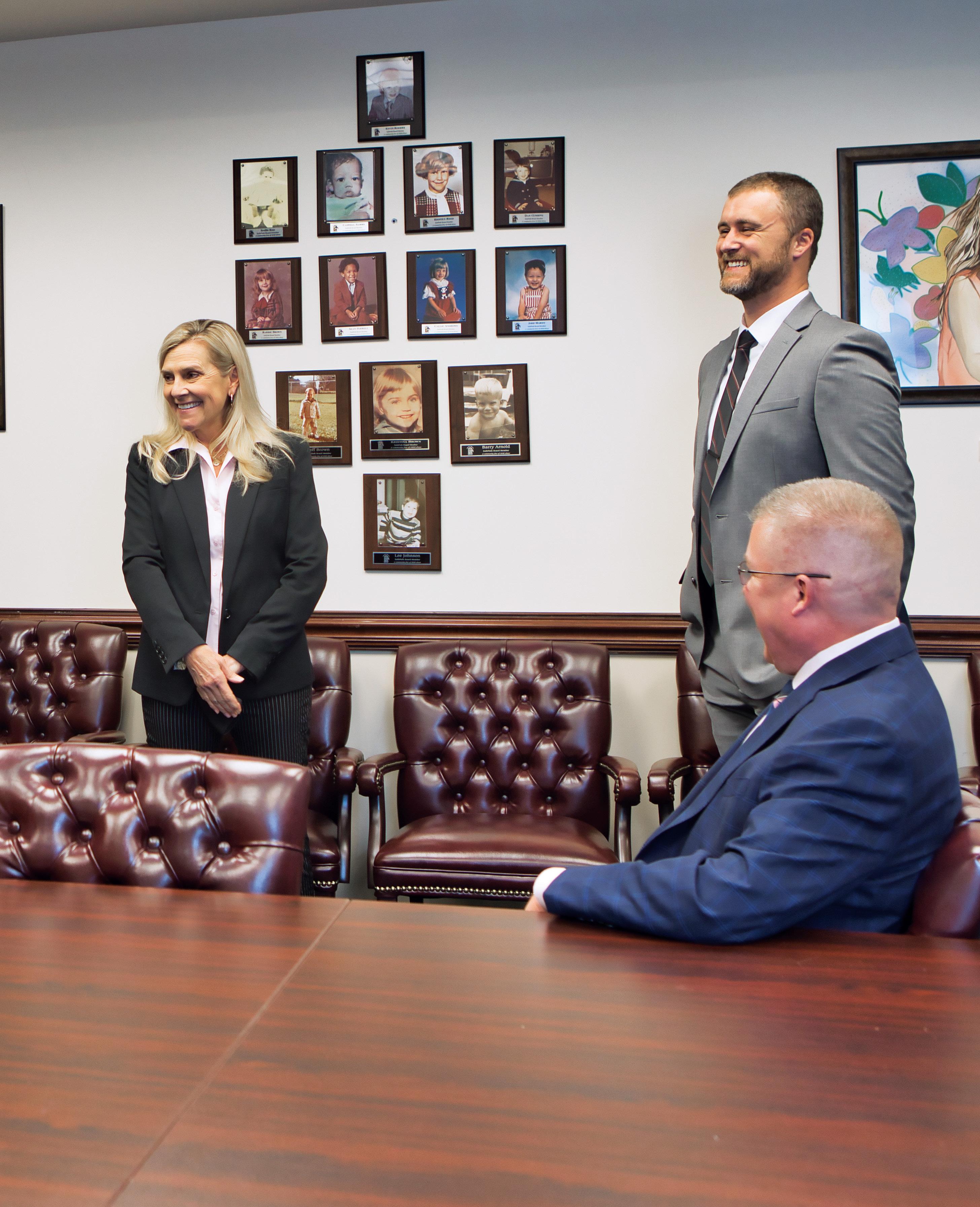
It all started by happenstance.
“I was at a groundbreaking for the Receiving Hope Center, which is a residential intake center for trafficked youth in Georgia, when I met Georgia First Lady Marty Kemp and started talking to her about the Children’s Advocacy Centers of Georgia (CACGA),” recalls Aleks Jagiella-Litts, CEO and General Counsel for CACGA
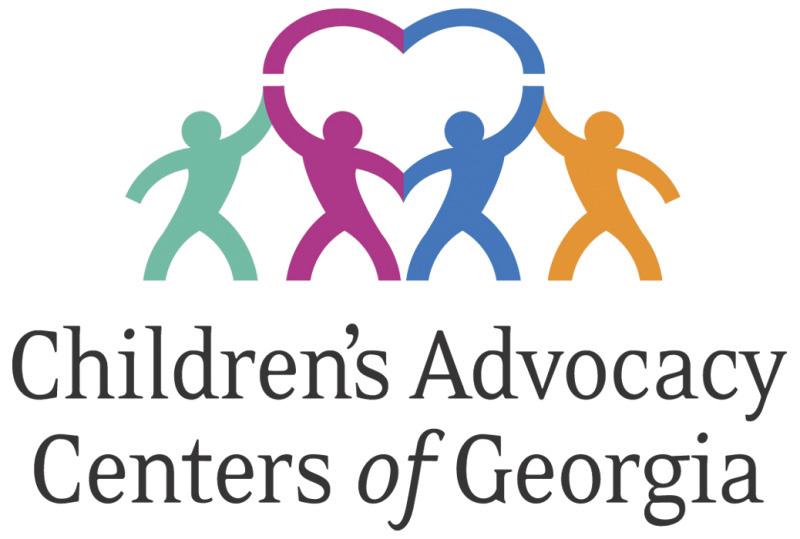
With 52 centers spanning across Georgia, Jagiella-Litts was confident that the CACGA could play an integral role in supporting the First Lady’s initiative, as children who are victims of sexual exploitation and human trafficking are also victims of child abuse. “No one takes better care of children in these situations than interventional specialists, detectives and health care staffs that work across the state in our children’s advocacy centers,” JagiellaLitts says. “Our centers have the specialists who can walk through these cases all along the way with children, and we can help change the trajectory for these children, which can have a ripple effect that can go on for generations.”
Why human trafficking?
While attending a press conference at Atlantic Station in early 2019 for her husband, First Lady Kemp saw 72 school buses lined up in the street outside the event. “It represented 3,600 children who are taken into human trafficking in a single year in Georgia,” she recalls learning that day. After campaigning for more than two years with her husband, First Lady Kemp wanted to know why she hadn’t heard this statistic before. “I wanted to know why we weren’t talking about it, and after I started learning about it, I figured out why people aren’t talking more about it — because it’s so difficult to talk about — but we are going to talk about it now.”
In February of 2019, First Lady Kemp formed the Georgians for Refuge, Action, Compassion and Education (GRACE) Commission, which was created to combat the threat of human trafficking in Georgia. “Sexual exploitation of children and human trafficking is everywhere,” she says. “It’s not just in metro Atlanta, and it’s not just in poverty-stricken areas. It gives nobody a hall pass and affects everybody. We just need to be able to talk about it so that our kids are aware of it, and so that we can help protect our vulnerable.”
In order to support First Lady Kemp’s push to end human trafficking and sexual exploitation of children in Georgia, CACGA helped create the Commercial Sexual Exploitation of Children (CSEC) Response Team. Launched in October 2020, the team is a multiyear project administered by the Criminal Justice Coordinating Council and funded in part by an $800,000 grant from the Temporary Assistance for Needy Families and the Office for Victims of Crime. The CSEC Response Team is designed to improve the lives and overall outcomes for child and youth victims of human trafficking, child sex trafficking, and other sexual exploitation of children for commercial purposes.
“We formed the GRACE Commission so that Gov. Brian Kemp and I could bring all the experts to the table, and we learned through the creation of the CSEC Response Team that there have been experts who have been working on this for decades all along,” says First Lady Kemp. “I’m humbled and honored to be associated with so many great people who are working so hard. I’m just here to support them.”
Jagiella-Litts says that Georgia is lucky to have our CSEC Response Ream, as well as support from First Lady Kemp and the state, because programs like this are not available in some states. “People are often afraid to talk about this, because it’s a very secretive topic,” she adds. “But we protect the perpetrators by keeping it in the dark, and you can’t eradicate something you can’t see or isn’t being talked about.”
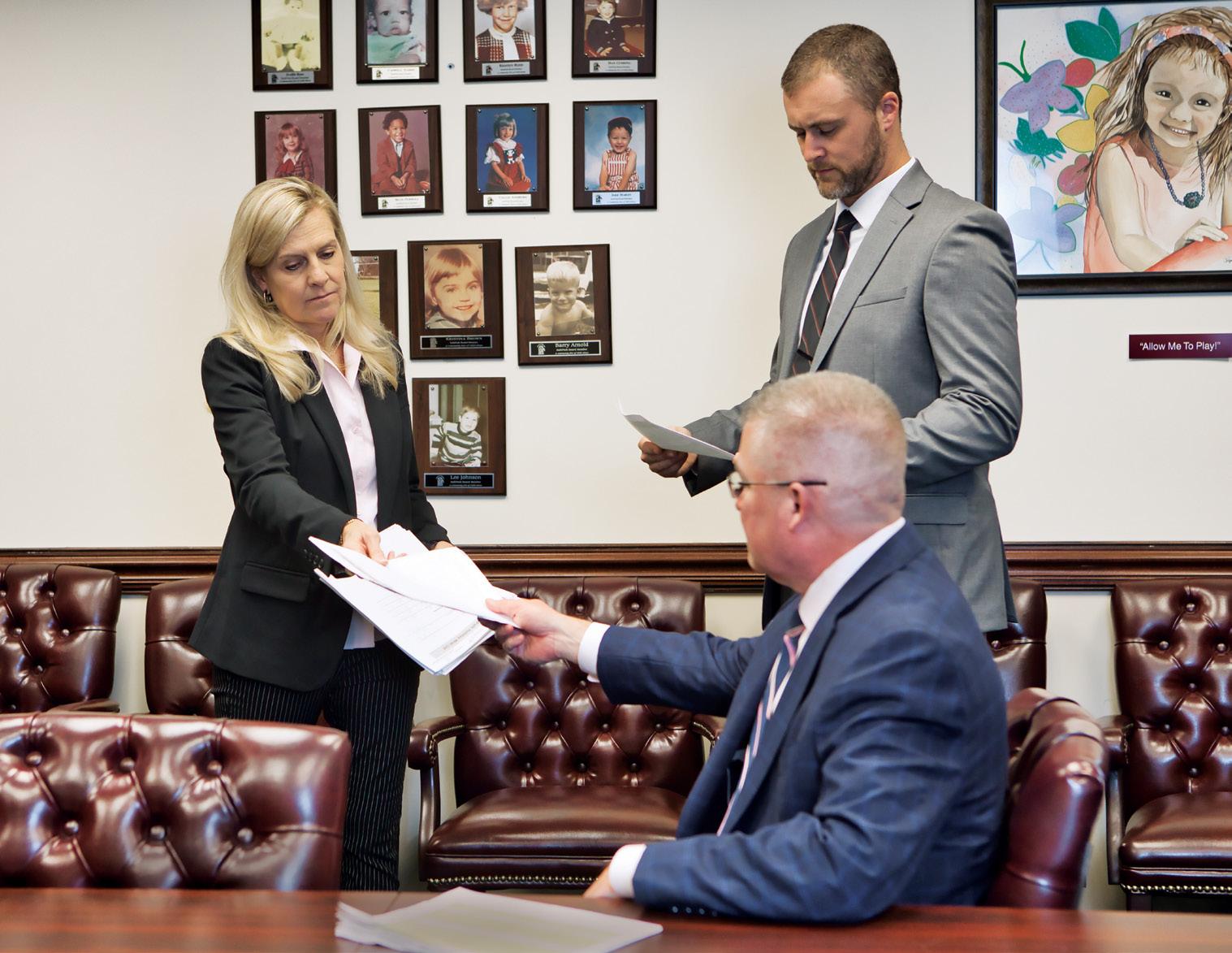
A snapshot of CSEC Response Team referrals received since Oct. 1, 2020: Total number of referrals....... 181 Active cases ........................... 138 Closed cases............................ 40 Hotline calls............................ 103 Web referrals.......................... 171

(overlap with Hotline for many)
SafePath stepped up to serve
Before launching the CSEC Response Team, Jagiella-Litts reviewed state data to help identify regions that are considered “hot spots” for the commercial sexual exploitation of children. Three of the hot pots are in the Atlanta area, including Cobb County, and a fourth is in middle Georgia. Each hot spot received a $40,000 grant to help support their response to CSEC in their regions.
“I was one of the first people Aleks reached out to,” says Jinger Robins, CEO and founder of Marietta-based SafePath Children’s Advocacy Center, which serves children and families in Cobb County and surrounding areas. “She asked if we’d be willing to take on this challenge as one of the core regions with higher
Left to right: Georgia First Lady Marty Kemp; Sgt. Hunter Llewellyn, Cobb County PD; Aleks Jagiella-Litts; and SafePath’s Jinger Robins.
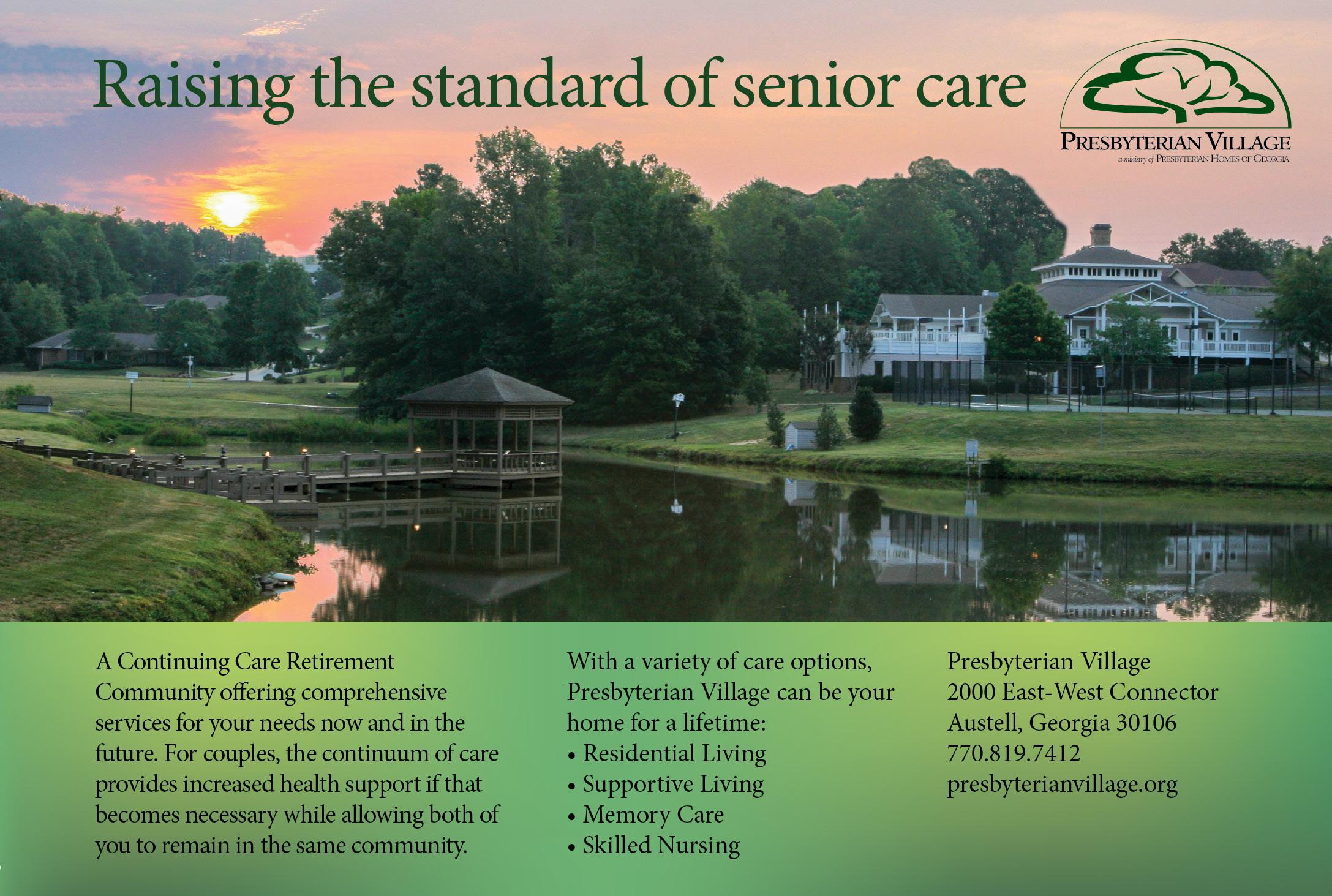
Left to right: Aleks Jagiella-Litts, Georgia First Lady Marty Kemp, and SafePath’s Krystina Bush, Intervention Support Associate.
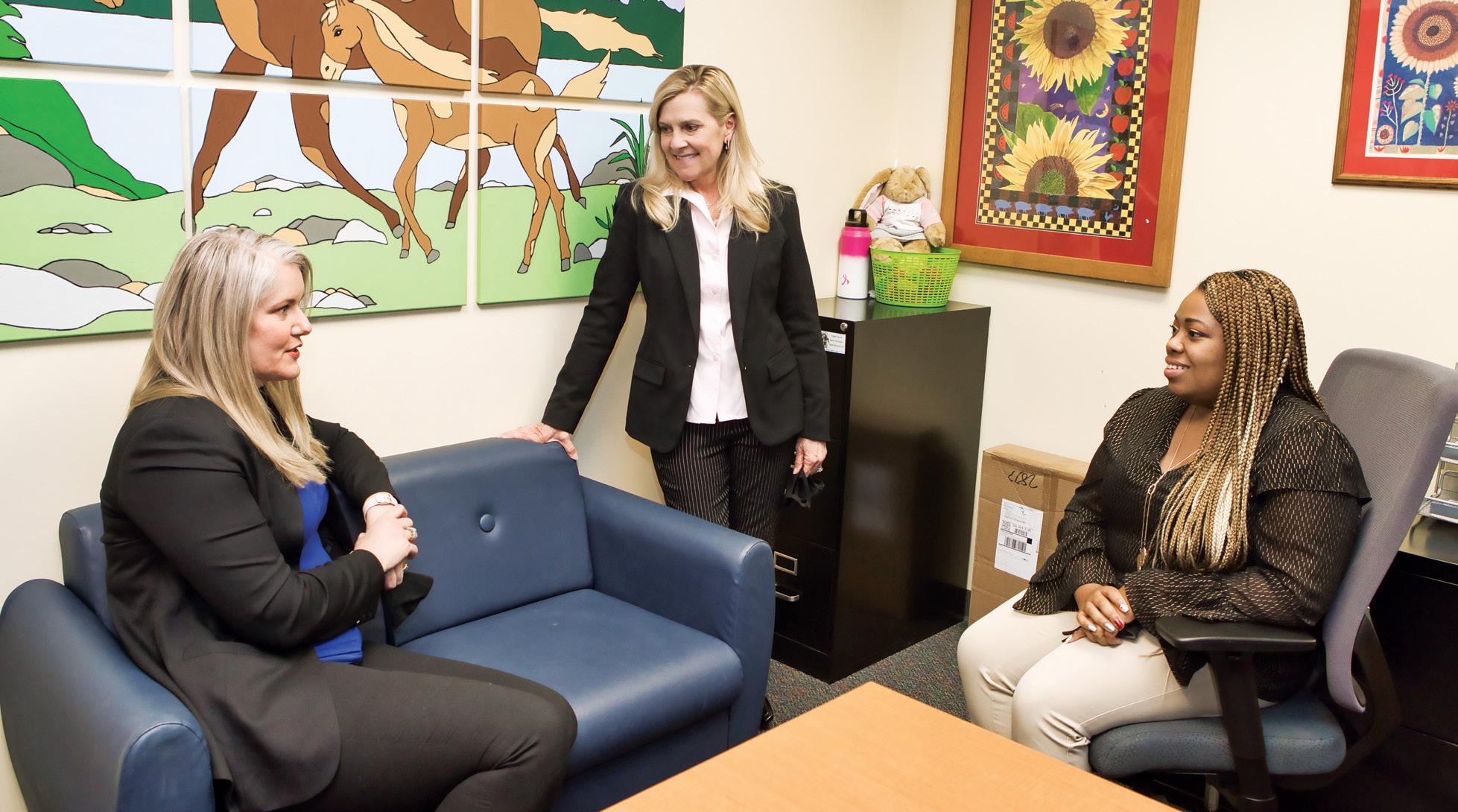
It’s time to open your eyes
The internet is so prevalent these days, especially with the pandemic, so it’s even more important for parents, teachers, and caregivers to keep a watchful eye on the changing behaviors of young people.
“A lot of parents are handing an iPad over to their child and asking them to entertain themselves while they work,” Jagiella-Litts says. “That child could get on an app and you think it’s just a game, but people are able to communicate through those games. And it’s not just strangers, it’s people children may know. There are also young ladies and men who are selling naked pictures of themselves on the internet.”
Things to watch out for may include children who suddenly have a cell phone or extra cash — when the child doesn’t have a job and won’t really say where the money comes from — or if they notice the child has a tattoo, as it’s illegal for children under 18 to get tattoos in Georgia, even with parental consent.
To learn more about how to identify the signs of sexual exploitation of children or human trafficking, visit youtube.com/embed/uaXBIqF9wc?rel=0. The Georgia Department of Administrative Services worked with First Lady Kemp to create a 30-minute training video. “It equips you with the tools to know what to look for, because once you learn how to identify it, you can’t help but want to do something about it,” First Lady Kemp said.

—Georgia First Lady Marty Kemp
numbers, and I didn’t even stop for a second to think about it. I knew we wanted to say, ‘yes.’”
SafePath is one of the strongest children’s advocacy centers in the state, says Jagiella-Litts. “Jinger has a phenomenal intervention team. They are on every training we provide, and they are always
Left to right: Aleks Jagiella-Litts, Det. Clint Monahan, Georgia First Lady Marty Kemp, and SafePath’s Gail Garland, Director of Intervention.
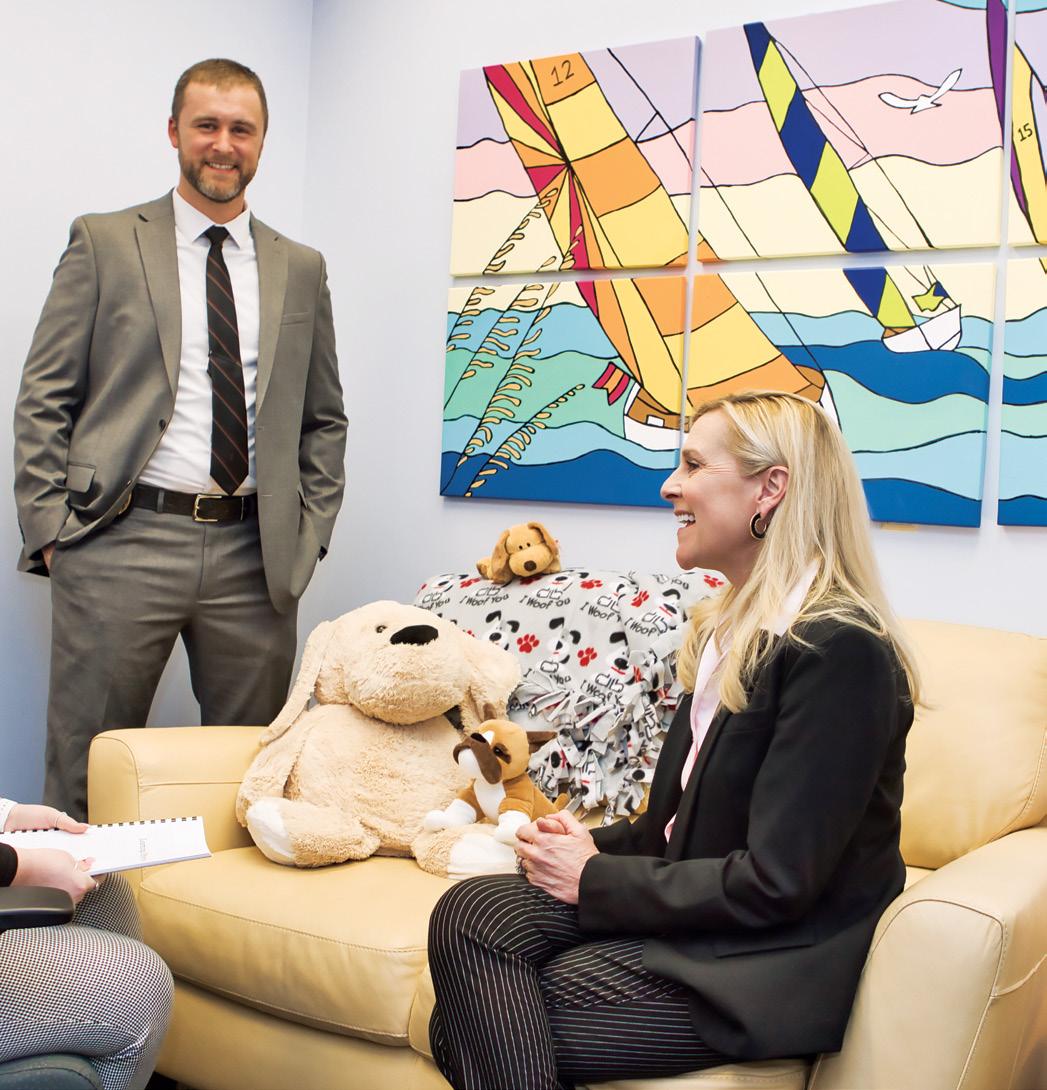
SafePath’s Lindsey Cheatham, Advocate, Sgt. Hunter Llewellyn, and Georgia First Lady Marty Kemp.
there and want to know how they can do better to serve the kids across our state.”
Upon learning about the CSEC Response Team and how children’s advocacy centers would support First Lady Kemp’s initiative, Robins recalled a child abuse case her team responded to 15 years ago. “The parents were having their teenage daughter engage in sexual behavior with the owner of their trailer for their rent,” Robins recalls. “Looking back, we’ve had a number of cases like that, but they were never identified as sexual exploitation or human trafficking.”
They have also realized that runaways aren’t always runaways. “Through a different lens of human trafficking and child exploitation, we are trying to figure out who or what those children may have been running away from or to,” adds Robins. And with support from First Lady Kemp, the GRACE Commission, and the CSEC Response Team, SafePath is now able to better identify and serve children who are victims of sexual exploitation and human trafficking.
“This partnership makes Cobb an even a better place to live,” Robins adds. “We are offering an ‘out’ for these children, and we are offering the services it takes to protect our children — not just from a basic level, but from all the intricate levels that get involved with children who are sexually exploited and victims of trafficking. That is huge, because it shows that Cobb’s commitment to protecting children has grown to the next level.”
And First Lady Kemp is extremely appreciative for the work of Robins, SafePath, and other children’s advocacy centers across the state that are working diligently to combat this issue. “Thank you for putting a louder voice on this,” she concludes. “Everybody deserves a good life. These kids don’t deserve to lose their childhood. We are going to fight for them — every single day — until we can get this out of our state.” n
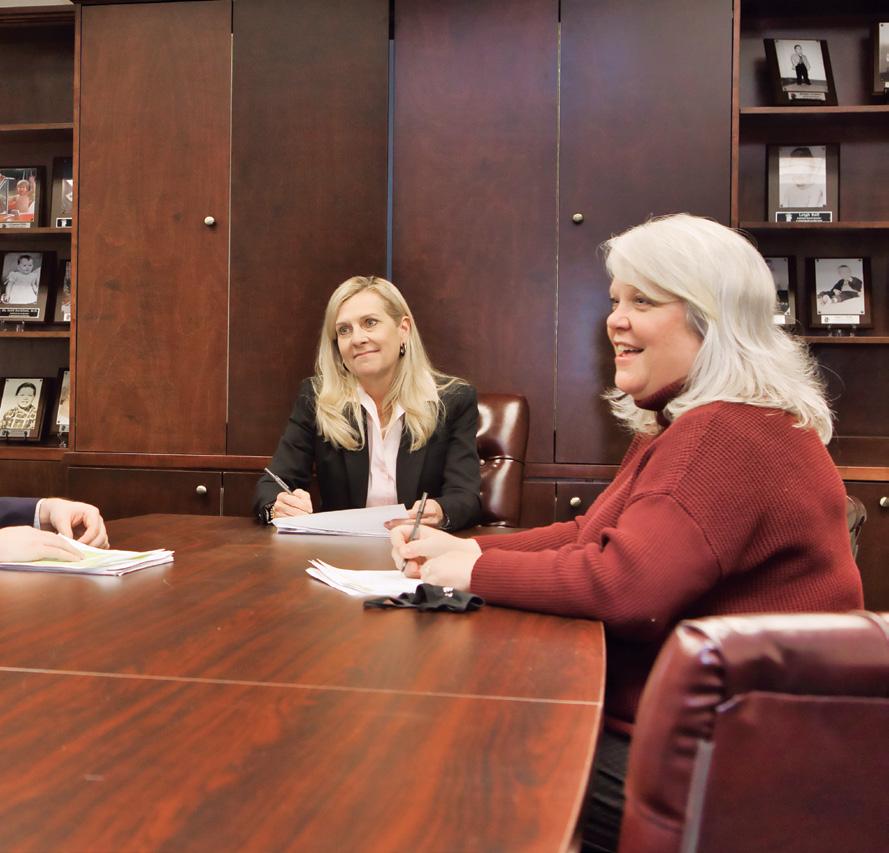
Helpful resources
LOCAL AND STATE WEBSITES:
GRACE Commission: gov.georgia.gov/first-lady/
grace-commission
Children’s Advocacy Centers of Georgia: cacga.org SafePath Children’s Advocacy Center: safepath.org First Lady and GRACE Commissions Human Trafficking Awareness training video: youtube.com/embed/uaXBI-qF9wc?rel=0






